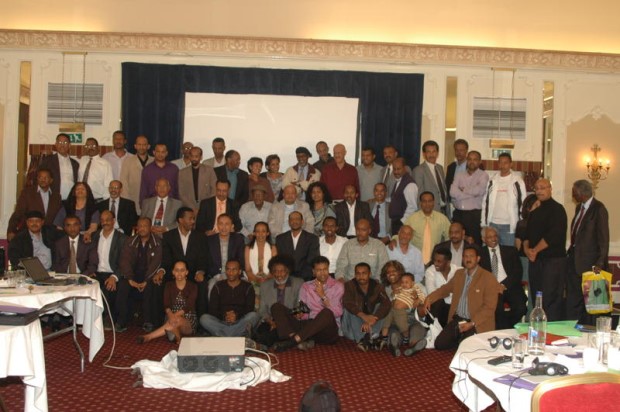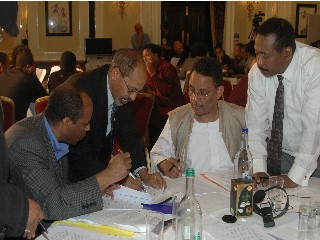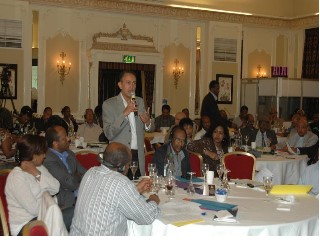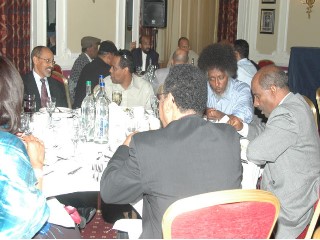Report on the Brighton Peace Conference
 Introduction: The Brighton Peace Conference (BPC) which took place 21-23 May 2010 was successfully concluded. The primary concern of the conference was peace within Eritrea and the Horn of Africa. The conference attracted a good cross-section of peace-loving Eritreans from many parts of the world. Themes explored during the conference included: ‘the Vision of Peace’, ‘Learning and Chartering Peace’, ‘Building Trust, Building Hope: Promoting Promising Possibility of Peace’ and more.
Introduction: The Brighton Peace Conference (BPC) which took place 21-23 May 2010 was successfully concluded. The primary concern of the conference was peace within Eritrea and the Horn of Africa. The conference attracted a good cross-section of peace-loving Eritreans from many parts of the world. Themes explored during the conference included: ‘the Vision of Peace’, ‘Learning and Chartering Peace’, ‘Building Trust, Building Hope: Promoting Promising Possibility of Peace’ and more.
The main objectives of the conference were to ratify a Peace Charter that calls on Eritreans and the peoples of the Horn of Africa, including governments, civil society organisations, religious and community leaders and various institutions to take steps towards peaceful co-existence, and to draw an action plan on how to achieve objectives set out in the charter of expanding the peace movement to disseminate the message of peace among Eritreans and people of the Horn of Africa. The BPC was preceded by the London Peace Conference which took place 18-19 Dec, 2009. The previous conference mandated a London-based group of nine to draft a Peace Charter and organise a larger conference which comprised up to 70 delegates.
religious and community leaders and various institutions to take steps towards peaceful co-existence, and to draw an action plan on how to achieve objectives set out in the charter of expanding the peace movement to disseminate the message of peace among Eritreans and people of the Horn of Africa. The BPC was preceded by the London Peace Conference which took place 18-19 Dec, 2009. The previous conference mandated a London-based group of nine to draft a Peace Charter and organise a larger conference which comprised up to 70 delegates.
Conference Participants: The conference was attended by 70 delegates from Australia, Kenya, South Africa, Sweden, Canada, Germany, the United States, Switzerland, the Netherlands and United Kingdom. Delegates from Ethiopia, the Sudan, Qatar and AE could not attend the conference due to some personal and visa problems. Eighteen percent of the delegates were women; fifteen percept academics, and the rest were activists, professionals and concerned citizens. The composition of the delegates was well balanced along religious beliefs, ethnic belonging and geographical distribution. Forty-five percent of the delegates were Muslims. Fourteen delegates were representative of various civil societies. See appendix 1 for a list of participants.
Organisations that were represented in BPC: The following organisations were represented in the Brighton Peace Conference: Al Wifaq, Asmarino.com, Citizens for Democratic Rights in Eritrea, Eritrean Community for Human Rights and Refugee Protection, Eritrean Democratic Alliance (by way of the paper they presented), Sinit Selam, Eritrean for Human and Democratic Rights - UK, Eritrean Global Solidarity, TV Zete, Eritrean Journalist Association, Eritrean law Society, Eritrean Movement for Democratic and Human Rights, EriForum and Release Eritrea.
International Speakers: Two prominent international personalities took part at the conference: Mr Stein Villumstad, the Deputy Secretary General of World Conference of Religions for Peace, and Mr Andre Zaaiman, founding Director of NDIBANO who served the Democratic South African Government in various senior capacities in the fields of foreign affairs
Overall Picture of the BPC: We Eritreans find ourselves somewhat divided along political, religious, linguistic, ethnic and societal divides. The old rivalry between the two former factions, ELF and EPLF, is still alive in the minds of many veteran fighters and their respective supporters. The skewed attitudes between some Highlanders and Lowlanders that is, intermittently, contrived and exploited by negative forces within our communities have negatively affected many Eritreans. Moreover, it is distressing to sense the mistrust that exists between Muslims and Christians which derives from untreated societal improprieties. However, the BPC, in its pursuit of the elusive concept of peace, was unique in a sense that it successfully attracted a good number of Eritreans from all walks of life. The conference, by accommodating Muslims and Christians, Highlanders and Lowlanders, veteran ELF and EPLF fighters and their respective supporters, managed to break old barriers that kept segments of our society apart. The delegates conferred with one another, celebrated Eritrean Independence together and sat at round tables to discuss all the options peace offers to Eritreans as well as people of the Horn.
 The positive tone of the BPC was set at the plenary on Friday 21 May which was chaired by Former Amb Hummad Kulu, the spokesperson of the Organising Committee. The welcome address was made on behalf of the Organising Committee - Dr Gaim Kibreab (Prof of Sociology at South Bank University), Mr Suleiman Husein (Chair person of CDRie), Ms Selam Kidane (activist – Release Eritrea), Mr Mohamed Tahr Debsay (journalist/Chairperson of CDRie’s London Chapter), Mr Salah Aboray (writer/member of CDRie Executive committee of CDrie), Mr Redi Aybu (Rep of EHDR-UK), Mr Samuel Ghebrehiwet (Journalist) and Mr Dawit Mesfin (activist / researcher at Birbeck College – University of London),. Additionally, Dr Berhan Ahmed (Melbourne University), Mr Elias Habteselassie (consultant), Berhane Gebrenegus (People’s Rights Activist) and Khaled Abdu Mohammedsaid (journalist) were regional representatives for Australia, Africa, North America and Europe respectively.
The positive tone of the BPC was set at the plenary on Friday 21 May which was chaired by Former Amb Hummad Kulu, the spokesperson of the Organising Committee. The welcome address was made on behalf of the Organising Committee - Dr Gaim Kibreab (Prof of Sociology at South Bank University), Mr Suleiman Husein (Chair person of CDRie), Ms Selam Kidane (activist – Release Eritrea), Mr Mohamed Tahr Debsay (journalist/Chairperson of CDRie’s London Chapter), Mr Salah Aboray (writer/member of CDRie Executive committee of CDrie), Mr Redi Aybu (Rep of EHDR-UK), Mr Samuel Ghebrehiwet (Journalist) and Mr Dawit Mesfin (activist / researcher at Birbeck College – University of London),. Additionally, Dr Berhan Ahmed (Melbourne University), Mr Elias Habteselassie (consultant), Berhane Gebrenegus (People’s Rights Activist) and Khaled Abdu Mohammedsaid (journalist) were regional representatives for Australia, Africa, North America and Europe respectively.
The Conference was divided into three sections that included presentations and keynote speeches, discussions and ratification of the peace charter and planning a way forward.
Conference Proceedings
- May 21, 2010: As mentioned above, the conference was opened by Mr Hummad Kulu, former ambassador to Syria and Egypt, and a member of the Organising Committee, who welcomed the guests and gave a brief background history of the peace movement. He was followed by Mr Dawit Mesfin, the Chair person of the co-ordinating committee, who made general introductions of participants and their organisations. He proceeded to lead the session on the formal adoption of workable meeting procedures.
Mr Salah Aboray, member of the Organising Committee and a founding and executive member of CDRie, delivered a speech concerning ‘Awareness and Understanding of Peace’ on behalf of the Organising Committee. In his speech he stressed the importance of launching a peace movement which, if embraced by a multitude of Eritreans living in Diaspora, will reverberate throughout the country. ‘If we work hard and disseminate our message of peace to all then our vision will turn to reality in no time’, he accentuate.
Mr Aboray was followed by Mr Suleiman Husein, CDRie-Chair, who led the conference in discussions on participants’ expectations and aspirations. Many of the participants spoke enthusiastically and expressed their opinions freely on what needs to be done. Their enthusiasm and expressed goodwill include the following: ‘Let’s think globally and work locally’; ‘let peace be our guiding light’; ‘let’s reconcile the differences that exist among us; ‘Let there be workshops of peace wherever Eritreans reside’; ‘I want to experience real debates on real problems’; ‘Let’s reclaim our lost peaceful culture that we have somehow lost in the past decades’; ‘I would like to see some concrete actions laid out following the ratification of our charter’; ‘I would be happy if we adopt the charter and come up with some future plans’; ‘Realising that this is opportunity that is unique in its nature I would like us to tread carefully by inviting a multitude of our various communities – especially the youth’; ‘I left my home because it was no more peaceful, and now I am here in search of peace’.
- May 22, 2010: Nine speakers delivered speeches on various aspects of peace: Mr Paulos Tesfagiorgis (The Vison of Peace), Dr Habtu Bebre-Ab (Seek Peace and Pursue it), Mr Andre Zaaiman ( Learning and Chartering Peace), Mr Petros Haile (Peace is a Journey no Nation can Afford to Avoid), Mr Stein Villumstad (Religion and Peace, Belief, and Application), Mr Omar Jabir (Towards Eritrean-Eritrean Dialogue), Dr Mansura Dopico (Gender and the Agenda of Peace), Dr Angheson Astbeha (Buidling Trust, Building Hope: Promoting Promising Possibility of Peace), and Dr Daniel R Mekonnen (Nonviolent Struggle against Dictatorship in Eritrea).
Mr Paulos Tesfagiorgis, after clarifying that ECfP is not an organisation but a peace movement, proceeded to deal with the issue regarding hindrances to peace, the emboldening nature of peace and peace that is sustained by justice. His presentation was well received by the audience. After he wrapped up his speech on the vision of peace he was followed by Prof Habtu Gebre-Ab, from the University of Cincinnati, expressed his renewed hope in peace. Prof Habtu Gebre-Ab has been involved in numerous endeavours to uphold justice within disadvantaged communities. In his speech he strongly criticised those who, by hiding behind narrow sense of nationalism, glorify warfare. Throughout his speech he repeatedly stressed that peace is the only way forward for Eritrea and its neighbours.
After an engaging debate that followed the above two presentations, Mr Stein Villumstad, Deputy Secretary General of World Conference of Religions, was invited to the podium. Mr Villumstad, after he explained the importance of Global Peace Index, he went on to suggest that one role of the conference participants should be focused on helping to create the Eritrean Peace Index. Following Mr Villumstad’s presentation, Mr Petros Haile from the US, who headed the EGS delegation, took the stage to explain the indispensability of peace in the growth and development of a nation. After chronicling the necessity of peace as a mode of struggle, he concluded by saying that ‘peace and human dignity are two causes worth resolutely standing up for’.
In the afternoon, Mr Omar Jabir, a veteran ELF fighter who resides in Australia, took the podium. Much to the expectation of the audience, Mr Omar Jabir, a man with vast experience in dealing with Eritrean issues, delivered an excellent speech which depicted the different phases of the Eritrean struggle. He reflected on the promises of the revolution and the unfulfilled dreams that ensued after independence in great detail. His speech, which made many a mention of peaceful co-existence amongst Eritreans and the neighbouring countries as well as the necessity of maintaining continual dialogue with one another, was well received by the audience. His reconciliatory position, fatherly advice and smooth approach were much appreciated by many delegates.
Mr Andre Zaaiman, a long time ANC activist from South Africa who played significant roles in the Mbeki government, shared his colourful experiences with the audience. His speech was crucial to the on-going peace movement because it resonated among all activists. He laid emphasis on dialogue by saying: ‘always keep the middle ground and work diligently with your adversaries; engage with the people you disagree with’. He stressed the point that there should be clarity of purpose, well crafted strategy and strong organisation if the movement is to succeed. Moreover, he said that one needs to know him/herself well before embarking on such endeavours.
A great number of the audience were so enthused by the speeches of both Mr Omar Jabir and Andre Zaaiman, the moderators allocated more time for the question-and-answer session that followed their presentations. Mr Omar Jabir’s views - on peaceful means of struggle, constant dialogue, being more sensitive towards one another, to remain steadfast in times of adversity ... etc. were well received by the audience. Likewise, Mr Andre Zaaiman was asked many questions by members of the audience who believed his experience and ideas were, one way or another, relevant to the struggle they are waging.
During the evening session Dr Mansura Dopico took the stage to deliver a unique message which revolved around personal peace. Dr Dopico, a lecturer of social work at the Australian Catholic University, told the story of her life in such a way that she clearly showed that reconciliation, personal communication and forgiveness starts from one’s own life. Her account was so real and touching, and her presentation style was so effective that many were mesmerised by her daring but soft-spoken approach. Similarly, Dr Anghesom Atsbaha, a social activist and educator, delivered a lively and engaging presentation. His presentation was about empowering communities by building peace and building hope, re-energising the spirit of partnerships, encouraging institutions to collaborate in building a system of support that is designed to help activists to challenge the uncritically accepted beliefs as well as the taken-for-granted culture of violence. ‘Promoting a promising possibility of peace is no easy task’ he said. Moreover, he re-iterated that the peace movement will mark a milestone in the quest for direction and dedication in achieving historically inclusive, culturally grounded, politically just and socially humane societies.
Dr Daniel Rezene Mekonnen, a human rights scholar, currently a visiting researcher at the International Victimology Institute in Tiburg University, the Netherlands, presented an inspiring topic that revolved around peaceful struggle against dictatorship. The main focus of his presentation explored the viability of renewed conflict and the dangers of non-peaceful mode of struggle to combat the lurking dangers in the region. He did not dismiss the fact that some may rise up in arms to fight against injustice but at the same time he stressed the obstacles that armed struggle for may erect in such situations. By highlighting the need for a peaceful struggle, he warned: ‘focusing on the pragmatic issues it can be concluded that rather than facilitating the kind of change that is required in Eritrea another round of violence could in fact result in causing catastrophic scars on the society’.
During dinner the delegates marked Eritrean Independence by raising money for impoverished and disabled war veterans. Mr Hussen Mohamed Ali, a renowned Eritrean artist, provided entertainment for the evening.
May 23, 2010: the third day of the conference hosted two more speakers - Mr Elias Habteselassie, a distinguished Eritrean consultant with vast experience in the NGO world and worked for the UN and taught at Berkley, California and Dr Berhan Ahmed, a senior research fellow at the University of Melbourne.
Mr Elias Habteselassie’s presentation was directly linked to what was to follow in the next session of deliberation: the Peace Charter. The main issues of his presentation answered the following questions: Why a call for peace now? Peace for whom and by whom? How did the idea for this peace movement originate? Who are we and why are we so concerned about peace and peaceful means of struggle? Who will be our partners in this struggle? What are the national and regional contexts for our peace movement? What is a peace charter and why do we need one? In the end he cited the historical examples of some charters, specifically from the era of the Magna Carta to the present. Mr Habteselassie’s lively and hands-on presentation attracted various participants to comment and ask questions on way forward.
The last speaker was Dr Berhan Ahmed, a eminent Eritrean scholar from Australia. He, through his longstanding commitment to community, environment and social justice, is a well-known individual across immigrant communities in Australia. Dr Berhan Ahmed, who partook in the previous conference and served as an advisor to the London-based group that drafted the Peace Charter, delivered a well crafted speech on prospectives of peace and the challenge of food security in the Horn of Africa. He argued that peace is a process, and that process cannot occur within an environmentally unbalanced environment.
The rest of the day was set aside for discussions on the Peace Charter and its implementation. Various sessions were held to examine, debate and finally ratify the charter. After intensive and thorough discussions on many challenging issues concerning Eritrea and the wider Horn of Africa region, the conference:
- Ratified the proposed Peace Charter which will be used to guide future activities of the peace movement.
- Elected fifteen individuals to organise the work of ECfP for the next six months.
- Developed an action plan based on the ideals and objectives stated in the charter forward.
- Expanded on short and long term projects:
- research (causes and resolutions of conflict);
- conduct workshops and seminars in areas populated by Eritreans;
- concretise the administrative structures of the movement;
- facilitate dialogue between various Eritrean groups;
- devise ways to engage other players from the Horn region.
Conclusion: The conference, after having discussed many issues of concern - ongoing and potential social, political, economic, environmental crises as well as the potential conflict facing Eritrea and the Horn of Africa - considered ways and means of bringing Eritreans together to work for internal and regional peace.
The BPC’s distinctive methodology and peace-ideology was well embraced by the participants that many were suggesting of ways to keep the momentum that has been created by the conference. The balance that was struck reflected the true nature of the Eritrean society abroad – i.e. the coming together of Muslims and Christians, Highlanders and Lowlanders, people of different political persuasions, young and elderly, male and female, activists and concerned citizens, academics and professionals. The conference was generally accredited for its genuine efforts to bring Eritreans together for the cause of peace.
The Steering Committee
London, 30 May 2010
Appendix 1.
FIRST NAME SURNAME COUNTRY
Abdulkadir Mohamed Dawod, Mr GB
Ahmed Mohammed Idris, Mr SE
Ahmed Mohamed Saleh Idris, Mr SE
Ahmed Suleiman Abdella, Mr UK
Aida Kidane, Ms SE
Alazar Hagos, Mr SE
Ali Hindi, Mr UK
Amal Mohamed Saleh, Ms GB
Andre Zaaiman, Mr ZA
Anghesom Astbaha, Dr US
Asefaw Ghebrekidan. Mr GB
Asia AbdulKadir, Dr (Ms) KE
Bairu Sium, Mr CA
Berhan Ahmed, Dr AU
Berhane Ghebre Negus, Mr US
Daniel R Mekonen, Dr NL
Dawit Mesfin,
Mr (Project Co-ordinator) GB
Elias Habteselassie, Mr KE
Fessahaie Ghebrehiwot, Mr GB
Fessehaye W Zemichael, Dr GB
Feven Gideon Mengesha. Ms DE
Fowzia M Hassen, Ms US
Gebru Tesfamariam, Mr GB
Ghirmai Zemicheal, Mr DE
Habte Giorgis Abreha, Mr GB
Habtom Yohannes, Mr NL
Habtu Ghebre-Ab, Dr US
Hamid Izaz, Mr GB
Humed Kullu, Mr (Organiser) GB
Hussen Saad, Mr GB
Husein Mohamed Ali, Mr GB
Ibrahim Mohammed Ibrahim, Mr NL
Idris Hummed, Mr GB
Jallaway Saeed. Mr CH
Jemal Ibrahim, Mr GB
Jemila Ali Mohammed, Ms SE
Kamal Ismail, Mr GB
Khaled Abdu Mohammedsaid, Mr SE
Khalid Ibrahim, Mr UK
Khalid B Beshir, Mr GB
Khedijah Ali Mohamed-Nur, Ms GB
Kiros T Beyene, Mr GB
Mansura Dopico, Dr (Ms) AU
Makonnen Woldu, Mr AU
Mebrahtu A. Woldemariam, Dr GB
Mebrat Deres, Ms GB
Mehretab Afworki, Mr DE
Meriem Omer, Ms SE
Meron Estefanos, Ms SE
Mohamed Noor Ibrahim, Mr GB
Mohamed Tahr Debessay, Mr GB
Mustafa Kurdi, Mr GB
Omar Jabir Omar, Mr AU
Paulos Tesfagiorgis, Mr (Pro Man) SA
Petros Haile, Mr US
Petros Tesfagherghis, Mr GB
Redi Aybu, Mr (Organiser) GB
Salah Aboray, Mr (Organiser) GB
Samrawi Okubai Araia, Mr US
Samuel Gebrehiwet, Mr (Organiser) GB
Selam Kidane, Ms (Organiser) GB
Stein Willumstad, Mr NO
Suleiman Hussein, Mr (Organiser) GB
Surafiel Yakob, Mr GB
Teklom Gebre-indirias GB
Tesfaldet Meharenna, Mr US
Tesfamariam Mehari, Dr UK
Tsedal Yohannes, Ms UK
Yebio Woldemariam, Dr US
Yemane Kassa, Mr GB
Yoel Berhe Yual Berhe Mr UK
Yonas Mehari, Dr US
Apologies
Gaim Kibreab, Dr UK
Abdullahi Tekruray Hagos, Mr AE
Salah Mohamedzein Mohamed, Mr ET
Ibtisam Adem, Ms UK
Gamal S Adam Mohamed Ali, Sheik SD
Salah A Idriss Mohammed Ali, Mr SD
Abdelaziz Ismail Osman Ali, Mr SD
Bothina Nasser, Ms SE
Gamal Osman Himad, Mr SD
Ibrahim Osman Kabushi, Mr GB
Idris Abubaker, Mr UK
Ismael Gabayta, Mr GB
Omer Ahmed Ibrahim, Mr QA
Kidane Mengsteab, Dr US
Yousuf Ibrahim Ajmat, Mr CH
Yosief Ogbagiorgis, Mr UK


![[AIM] Asmarino Independent Media](/images/logo/ailogo.png)